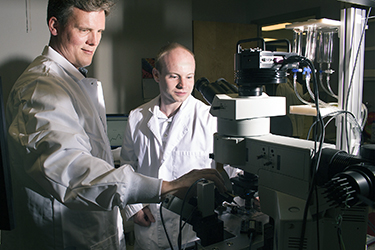Environmental Sciences Research
 Welcome to the Environmental Sciences research cluster in the Department of Biological Sciences at Wright State University. Our goal is to expose students to multidisciplinary training opportunities and provide broad exposure to fundamental cellular, system, and organismal processes in plant and animal physiology, membrane transport and homeostasis, botany, entomology, parasitology, and exercise biology. Our research laboratories employ a wide range of biological systems including the nematode Caenorhabditis, gray treefrogs, bullfrogs, dust mites, ducks, lizards, crayfish, parasitoid wasps, tachinids, planarians, fish, algae, and many other plants, animals, and microbes.
Welcome to the Environmental Sciences research cluster in the Department of Biological Sciences at Wright State University. Our goal is to expose students to multidisciplinary training opportunities and provide broad exposure to fundamental cellular, system, and organismal processes in plant and animal physiology, membrane transport and homeostasis, botany, entomology, parasitology, and exercise biology. Our research laboratories employ a wide range of biological systems including the nematode Caenorhabditis, gray treefrogs, bullfrogs, dust mites, ducks, lizards, crayfish, parasitoid wasps, tachinids, planarians, fish, algae, and many other plants, animals, and microbes.
Our research laboratories are training grounds for undergraduate students as well as graduate students from the Wright State Master of Science Program in Biological Sciences, the Wright State Biomedical Sciences Ph.D. Program, and the Wright State Environmental Sciences Ph.D. Program. Principal Investigators and their trainees sustain research awards from funding agencies such as the National Institutes of Health and the National Science Foundation, as well as from private companies and research foundations.
Brief descriptions of Organismal Biology faculty research interests are listed below. For more thorough descriptions of research and training opportunities, please view the websites of individual faculty members.
Research Interests
- Distribution and abundance of species over space and time
Volker Bahn, Ph.D.
- Speciation genetics; morphological evolution; evolution of adaptive gene complexes
Scott Baird, Ph.D.
- Induced plant responses to herbivores and pathogens and the chemical ecology of invasive plants, insects, and microbes
Don Cipollini, Ph.D. - Chemosensitivity and effects of environmental temperature on poikilotherms
Lynn Hartzler, Ph.D. - Cytotoxicity of Lou Gehrig's disease proteins; Development of novel therapeutic approaches
Shulin Ju, Ph.D.
- Molecular evolution and genetic diversity; DNA bioinformatics; forensic DNA analysis
Dan Krane, Ph.D.
- Evolution of populations/species; influence of natural selection on non-coding DNA
Jeffrey Peters, Ph.D - Insect herbivores, parasitoids and their interactions John Stireman, Ph.D.
- Interactions between attached algae and herbivorous fish in Lake Tanganyika
Yvonne Vadeboncoeur, Ph.D.
- Interactome networks--evolutionary rewiring & perturbations in disease
Quan Zhong, Ph.D.
- Cellular and molecular physiology of mammalian skeletal muscel and the neuromuscular junction
Andrew Voss, Ph.D.

